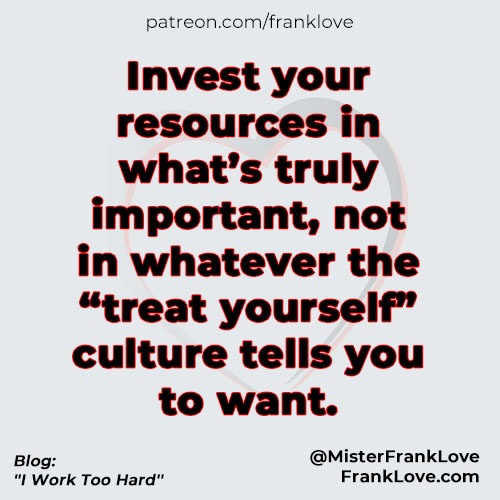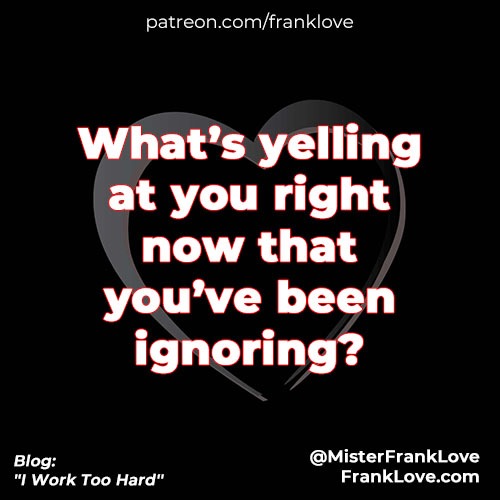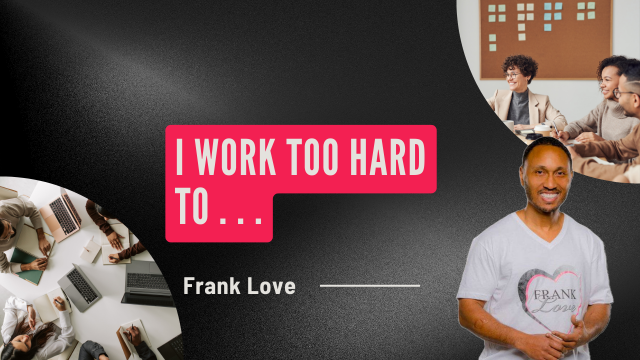 Decision-making organized around intentional priorities rather than short-term fixes empowers us to live more meaningful lives.
Decision-making organized around intentional priorities rather than short-term fixes empowers us to live more meaningful lives.
In my previous blog post, “Too Much Intelligence,” we discussed bringing more wisdom to our relationships and how this helps build connection rather than conflict.
We’ve all heard it, or maybe even said it: “I work too hard to not enjoy the things I want.” It rolls off the tongue like a prideful statement of fact, a justification for indulgence. But if we pause and look deeper, it’s often a dangerous mantra dressed up as self-care.
Initially, the sentiment sounds harmless. After all, who doesn’t want to reward themself for hard work? The problem is that “I work too hard to . . .” can easily become an all-access pass to financial recklessness, unhealthy habits, and ignoring what truly matters.
When we say it, we’re often implying that showing up for work entitles us to whatever we want, regardless of whether it fits our priorities, budget, or long-term goals. We are saying our effort is the currency for satisfaction, and the results—good or bad—don’t matter. That is irresponsible.
The Trap of Entitlement Through Effort
Our culture doesn’t make this easy. We live in a system that squeezes every drop of productivity from us. Work harder. Do more. Answer emails at midnight. Then, after a week of being drained, we’re bombarded with marketing messages and cultural signals telling us the antidote to exhaustion is buying something or making choices that may not be in our best interests. Often, the end result is an expensive purchase.
It’s a cycle: overwork, overspend, repeat. And the statement “I work too hard to . . .” keeps us locked in it. It gives us emotional permission to ignore the reality of our finances, time, or energy levels.
But working hard doesn’t guarantee wise decisions. It doesn’t erase the need for discipline. And it certainly doesn’t exempt us from the consequences of our choices.
Let the Results Speak
Instead of clinging to the “I work too hard to . . .” mindset, what if we flipped it? What if we let the results speak for us?
If we truly work hard, it will show up in more than just our exhaustion level. It will show up in our savings account, our relationships, our health, and our peace of mind. Hard work, the effort exerted, is only one part of the story. Another part is what that work produces.
When we lead with results, we’re forced to get honest about whether our priorities match our spending, habits, and energy. Are we putting our resources toward what really matters to us, or are we letting the “treat yourself” culture dictate our choices?
Allocating Resources with Intention
We get to allocate. Our time, money, and energy are finite. If we’re not directing them intentionally, someone else, usually a marketer, will.
Let’s ask ourself:
- What is God inviting me to work on?
- How much of my time, money, and attention am I actually giving that?
- What am I willing to let go of so I can invest more in what matters most?
When we think this way, “I work too hard to . . .” becomes irrelevant. We stop making decisions based on emotional exhaustion and start making them based on conscious priorities.
Pay Attention to What’s Yelling at You
Often, the signs are right in front of us. In our bank statements. In our relationships. In our bodies.
That argument we keep having with our partner about money? That’s something yelling at us.
That constant feeling of being stretched too thin? That’s something yelling. That nagging debt we keep swiping past with our credit card? That’s something yelling at us, trying to get our attention.
The point is not to feel shame, but to listen. Every choice we make, especially the repeated ones, tells us something about what we value. Sometimes the lesson is that our stated values and our lived values don’t match. That’s when it’s time to realign.
Relationships Are No Different
This isn’t just about money. The same principle applies to our relationships. If we find ourselves saying, “I work too hard in this relationship to not get what I want,” we might be ignoring our results. Are our actions building trust, intimacy, and respect? Or are they simply “hard work” without meaningful progress?
Just like with finances, effort without strategy can feel satisfying in the moment but produces little in the long run. The fix is the same: Listen and pay attention to the signs. Let’s adjust our choices based on what’s actually happening, not on what we think our hard work entitles us to.
A New Mantra

Maybe the phrase we ne
ed isn’t “I work too hard to . . .” but “I work intentionally.” That subtle shift in word choice changes everything. It moves us from entitlement to empowerment. From reflexive spending and overdoing to purposeful living.
We can work ourselves into the ground and still have nothing to show for it. Or we can work with focus, discipline, and alignment—and enjoy the things we want without debt, guilt, or chaos.
The next time we catch ourself about to say, “I work too hard to . . . ,” let’s stop and ask ourself:
- Is this decision aligned with my priorities?
- Do the results of my work actually support this choice?
- What is this moment trying to tell me?
Your work is valuable. Your time, money, and energy are valuable. Treat them as such. The rewards will take care of themselves.
In my next blog, “Laziness Does Not Exist,” I will talk about understanding the context of others and their shortcomings rather than leaping to judgment.
Watch my video I Work Too Hard To Related to this blog.
Watch Frank Love’s presentation “The Act of Caring.”
Subscribe to receive Frank’s weekly blog.
Become a sponsor of Frank Love and his work creating a loving cultures in our relationships with a monthly contribution of as little as $2. Sign up today at Patreon,com/FrankLove.
– – – – – – – – – – – – – – – – – – – – – – – – – – – – – – – – – –
Each week, Frank Love hosts Zoom support group meetings that assist women and men as we work to create a loving culture in our relationships. Calls occur from 7:00 p.m. to 8:30 p.m. EST and can be accessed by visiting FrankWeeklyCall.com.
- Tuesdays – Black Women: Creating a Loving Culture in Our Relationships
- Thursdays – Black Men: Creating a Loving Culture in Our Relationships
– – – – – – – – – – – – – – – – – – – – – – – – – – – – – – – – – –
Frank Love coaches individuals who are in (or wish to be in) a relationship toward creating a loving culture in their family. He is also the author of Relationship Conversations You Don’t Want to Have (But Should Anyway) and 25 Ways to Be Loving. To schedule a free consultation, contact Frank at Frank@FrankLove.com.



One comment
Frank Love
September 3, 2025 at 4:58 AM
https://www.instagram.com/reel/DLIOkldCpgF/?igsh=cXo3OTNtbzVycHk0